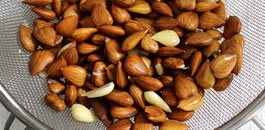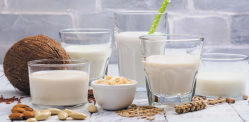"Almond milk contains around three grams of fat per eight ounce serving."
When it comes to milk, most British Asians are likely to opt for traditional cow’s milk, preferred by mother’s everywhere for their ‘healthy growing bacheh’.
Even soy milk is an increasingly popular choice with some families, but for those of you who are looking for a dairy free substitute or just a healthier option, almond milk may just be the answer.
Almond milk is naturally full of nutrition, relatively more so than soy milk and rice milk which need to be fortified with extra nutrients and vitamins. Almond milk also has a rich fat content, and these are essential healthy fats which the body needs.
A healthy body requires a good balance of properties, and fat is included in this. In fact, unsweetened almond milk has far less calories than ordinary cow’s milk, at just 40 calories per serving.
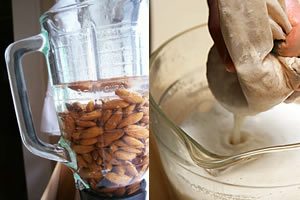
Almond milk contains around three grams of fat per eight ounce serving, so its fat content is equivalent to that of rice milk.
Interestingly, almond milk is not a new invention, and has actually existed for a long time, from medieval Europe to the Middle East, it has always been a popular beverage.
It is produced by finely grinding almond nuts together with water, and it is easy to make at home and can be kept longer than cow’s milk without spoiling. The best thing about the natural goodness of almonds is that homemade almond milk has the same nutritional value as commercially produced plain almond milk (that hasn’t been fortified).
To make almond milk at home simply add almonds or almond butter, water and any sweetener of your choice to a blender and mix well. Then strain out any almond pulp with a strainer or cloth and there you have it – homemade almond milk.
This glorious milk is full of all round goodness; it contains neither cholesterol nor lactose, is gluten free, contains no animal products, nor are any animals harmed in the making. It is suitable for vegans, vegetarians and those who suffer from lactose intolerance. Those with nut allergies however, should definitely stay away.
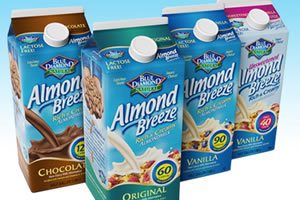
Alpro and Breeze are perhaps the most popular brands in the UK market today which sell a big variety of great tasting alternative flavours. Consumers should be wary however as the sweetened and flavoured varieties can contain up to 4-5 teaspoons of sugar!
The benefits of almond milk are abundant, in addition to its highly nutritional value, it can also help reduce cholesterol as well as clean your arteries.
It has also been known to reduce the risk of Alzheimer’s and osteoporosis, as it is full of vitamin D which can help build up cells.
Almonds contain selenium, magnesium, potassium, zinc, iron, fiber, vitamin E, manganese, phosphorous and calcium. The flavonoids in almonds are beneficial to the human diet as antioxidants help to neutralise free radicals which damage body tissue.
These flavonoids help prevent cancer and it can also help slow the signs of aging. Almond milk is often suggested to use to help lower blood-sugar levels and to treat constipation.
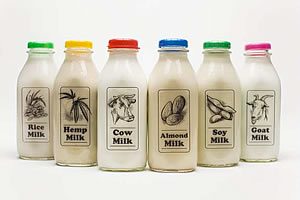
For any health-conscious individual, almond milk seems to tick most of the boxes. Its surge in popularity saw its sales increase by an impressive 79 per cent in the USA in 2011 alone.
In comparison to soy and rice milks, almond milk contains more vitamins and minerals. Soy milk contains a lot of protein but lacks the high levels of vitamins found in almond milk, and rice milk doesn’t contain much nutrition at all.
Almond milk however does not have as much protein and calcium as regular cow’s milk and some other animal milks, so it is not a ‘complete’ substitute to dairy. However, you can buy some brands that are fortified with these vitamins. It is always best to check the ingredients before you buy.
It seems that almond milk is a great substitute to other forms of milk, and it is quite beneficial to help live a well-balanced diet and lifestyle, not to mention it’s tasty!



















































